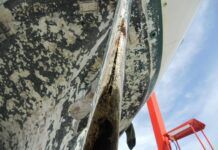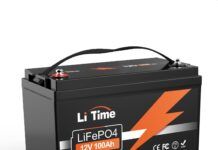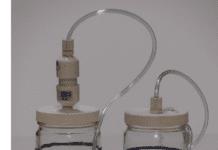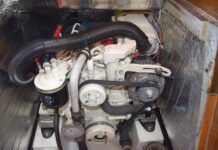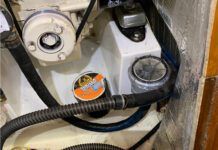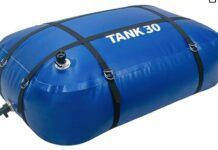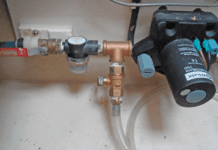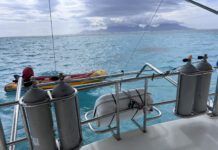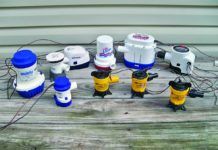I am the new owner of a 1979 Tayana Vancouver 42 with a Volvo D2-55B diesel engine installed in 2004. Fuel is held in two 80-gallon fiberglass tanks and filtered via a Racor 500 utilizing No. 2010 filters. I use 2-micron filters and Biobor JF Anti-Fungal additive. Despite fuel scrubbings, I continue to have to change primary fuel filters with each fueling. I have been told that I don’t need as fine a filter as the 2-micron, but I don’t want to risk increased maintenance of the diesel. What do you recommend? Mike Hirko The advice youve been given regarding your primary filters micron rating is correct, however, this isn’t the root of your problem.
Photo by Steve D’Antonio 288 Think of fuel filters as the window to your fuel tanks soul. The standard rule of thumb is that if the filters must be changed more often than every 100 engine operating hours-this is an unscientific threshold, if the engine idles for 100 hours, it pumps less fuel than if its operating at cruising rpm-then the tanks require cleaning, period. Theres no getting around the fact that the contamination found in the fuel filter comes from the tank(s). If the filter is clogging frequently, look to the tank rather than the filters micron rating. All diesel fuel tanks should be equipped with inspection ports, one for each baffled chamber. (One clean-out port installed in a multi-chambered tank is of little value.) If a tank is not equipped with inspection ports, it can be retrofitted using an inspection-port kit. (See
Tayana Vancouver 42
Gig Harbor, Wash.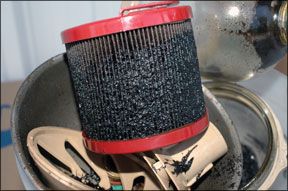
Using an antifungal agent with every fill up probably wont do any harm; however, too much of a good thing can be bad. Unless you are using all of the fuel in the tank before refilling and shocking the fuel with a microbial agent, you could accumulate too much of the substance. This may put the fuel “off spec,” meaning it doesn’t meet the American Society for Testing and Materials (ASTM) specification for diesel fuel. Additives, especially those with alcohol, may be harmful to the tank itself, particularly if it is fiberglass.
Remember, if theres no water in the tank, there can be no biological life. Periodically “stripping” water from the bottom of a tank negates the need for biocide. If the debris thats accumulating in your filters is not biological, then no amount of biocide will help. Often the contaminant is asphaltine, a naturally occurring mineral-based contaminant that settles out of diesel fuel.
Finally, in our opinion, sequential filtration is particularly effective. That is, its best to sequentially step down filtration, beginning with a comparatively coarse primary filter, say 10 microns, and then a finer, 2-micron filter. Typically, the on-engine or secondary filter specified by the manufacturer will be between 2 and 7 microns. This filter is always rated to prevent particles that can be harmful to a particular engines fuel-injection system from making their way past this gate keeper. (Engine owners have no choice in which filter is used here.) So the advice you were given is correct. Clean the tanks and use sequential filtration, and your filters shouldnt clog before 100 hours of run time.






